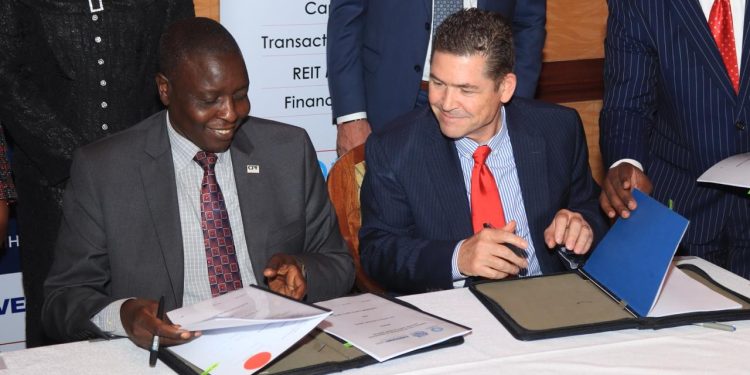American asset manager, Everstrong Capital, has signed an agreement with CPF Capital & Advisory Ltd. to raise US$ 1billion (KSh 129 billion) for the Usahihi Nairobi-Mombasa Expressway project.
- The initiative will onboard key stakeholders in the Kenyan capital markets, including commercial and investment bankers, insurers, and pension funds.
- Kenya will tap into the Public-Private partnership (PPP) model to finance the 440-kilometer, four-lane dual carriageway linking Nairobi and Mombasa.
- The agreement to spearhead local fundraising for a portion of the estimated US $3.5bn cost is intended to boost the country’s self-reliance prospects.
“This is more than just an infrastructure project. It is a bold step towards reshaping Kenya’s economy through private sector-led investments. It demonstrates the power of domestic institutional capital in fueling economic growth,” CPF Managing Director, Dr. Hosea Kili said.
The signing of the Transaction Advisory and Placement Services Agreement that will rope in partners in the local capital markets to support mega infrastructural projects, comes at the backdrop of the National Treasury’s upcoming review of how PPPs can be iterated. The government has appointed over thirty experts from Kenya’s financial sector to create a road map for mobilization of long-term local financing for strategic state projects.
The committee chaired by CPF’s Dr. Hosea Kili and deputized by Tom Mulwa will review appropriate Public Private Partnership (PPPs) deal structures that will attract local investors. Other members of the committee are drawn from all financial interests with considerable capital that could be leveraged on – including representatives from the stock market, banks, fund managers, and pension management schemes.
“This initiative highlights the strength of strategic partnerships between local and international investors, leveraging blended capital to bring large scale projects to life,” Dr. Kili said.
Public-Private Partnerships are collaborations between governments and private sector entities to finance, build, and operate projects. The scale of financing needed for public infrastructure projects has seen more foreign entities seizing the opportunities, with the government tied down to expensive, often controversial deals as a result. Local capital markets also remain passive and incapable of spurring their investments.
“Usahihi exemplifies my belief that Africa must transition from aid to trade on the path to self-reliance,” Kyle McCarter, Chairman of the Usahihi Expressway Ltd., and a former US Ambassador to Kenya, said.
The project received a nod in May last year after Everstrong Capital signed a deal with the Kenya National Highways Authority (KeNHA). The initiative intends to shorten the time motorists spend travelling between the two major Kenyan cities from the average 10.5 hours to 4.5 hours.
The mega project appeared to advance in 2017 when Kenya signed a Sh230 billion deal with American engineering firm Bechtel for the road’s construction. In 2019, the government suspended the construction of the Mombasa-Nairobi expressway after Kenya hit its debt ceiling.




